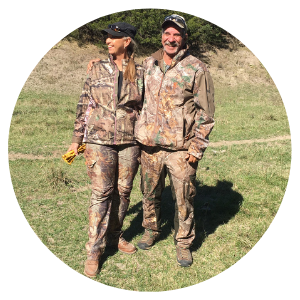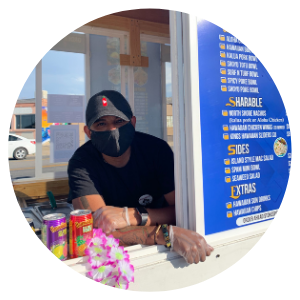Stories of Resiliency: Small business owners who inspired us in 2020
Over the summer, as small business owners began to share how they were pivoting their businesses to meet the needs of their communities and stay open during the pandemic, we were inspired to launch our Stories of Resiliency campaign on Instagram.
Over the past six months, we have shared dozens of stories from small business owners in our network who have expertly adapted their businesses and overcome massive unexpected setbacks. Here are some of their stories.
The California small business owner encouraging people to stay positive
 After years of agency life, Leslie Kim decided to embark on the path to entrepreneurship by combining years of experience in graphic design with her love for rock climbing. So for the past five years, Leslie has run Dynamite Starfish, a rock climbing-themed apparel company.
After years of agency life, Leslie Kim decided to embark on the path to entrepreneurship by combining years of experience in graphic design with her love for rock climbing. So for the past five years, Leslie has run Dynamite Starfish, a rock climbing-themed apparel company.
When COVID-19 hit, Leslie, like many of us, was feeling defeated and hopeless, so she turned to her art and created her “From Chaos Comes Growth” collection that provides an uplifting journal to healthcare or front line worker with every purchase. She says, “I want to tackle the fear of COVID-19 and weave hope into it.”
Her design was a huge hit and she sold 50 shirts in the first two weeks, with a portion of the sales going to the Navajo & Hopi Families COVID-19 Relief fund. She wants to continue to spread this message and support front line healthcare workers, so she has implemented a buy-one-gift-one program.
The veteran small business owner who relies on the tourist industry
 Veteran entrepreneur Roxanne Huggins has owned the Comstock Premier Lodge, a year-round bed & breakfast hunting lodge, ranch, and farm in Sargent, Nebraska since 2009. Working with her husband Mitch and one other employee, Roxanne saw an avalanche of event cancellations when the pandemic became widespread.
Veteran entrepreneur Roxanne Huggins has owned the Comstock Premier Lodge, a year-round bed & breakfast hunting lodge, ranch, and farm in Sargent, Nebraska since 2009. Working with her husband Mitch and one other employee, Roxanne saw an avalanche of event cancellations when the pandemic became widespread.
Roxanne and Mitch sought relief funding from the Paycheck Protection Program (PPP) and the Economic Injury Disaster Loan (EIDL), which helped them in covering costs of feeding the animals, high insurance premiums, and their mortgage. Though she initially encountered issues with her PPP application and only received a small EIDL, her business is in a much better position than when the pandemic first erupted.
Roxanne has seen an increase in bookings over the last few months, now that customers are feeling more comfortable with doing outdoor activities and the governor has repealed a ban on non-resident hunters. But this could all change if the state of Nebraska closes down again.
The Virginia small business owner who is working to keep his community safe
 Before COVID-19 hit, Ace Jones was working as a consultant providing IT, social media and event planning support for other businesses. But, when the pandemic hit, Ace found a new calling. Worried about the health of his father and neighbors, Ace started circulating masks around his community in the Tidewater / 757 area.
Before COVID-19 hit, Ace Jones was working as a consultant providing IT, social media and event planning support for other businesses. But, when the pandemic hit, Ace found a new calling. Worried about the health of his father and neighbors, Ace started circulating masks around his community in the Tidewater / 757 area.
When he started getting approached to do bulk orders of masks, his friends and family encouraged him to make a business out of it. And, so GMI Masks was born. Ace wanted to make sure his business was still giving back and, for every mask purchased, Ace donates a mask to a person in need. Because of his new business, he has been able to donate over 11,000 masks.
The small business owner who is working on his second pivot
 Eric and his partners started Bridgewater Studio in 2014 with the hope that their custom manufacturing company would serve as the last jobs they ever had. With backgrounds in theater, design and construction, the three quickly expanded their business from Eric’s loft apartment in downtown Chicago to what it is today—two warehouses, 80,000 square feet and 50 employees.
Eric and his partners started Bridgewater Studio in 2014 with the hope that their custom manufacturing company would serve as the last jobs they ever had. With backgrounds in theater, design and construction, the three quickly expanded their business from Eric’s loft apartment in downtown Chicago to what it is today—two warehouses, 80,000 square feet and 50 employees.
When stay at home orders were put into place, Eric and his partners prepared the warehouses to shut down not knowing when they would be able to go back to work. However, they didn’t spend long at home. That very weekend, they developed a plan to make face shields for healthcare workers. By Monday, they were back to work making prototypes.
This pivot has enabled Bridgewater Studio to avoid any layoffs and actually allowed the business to take on an additional 20 temporary employees to fulfill contracts for the face shields.
However, six months into the pandemic, supply has caught up with demand and PPP funds are running low. Orders for face shields have dissipated and Eric and his team have spent the summer finishing up pre-pandemic projects.
He explains, “PPP was a lifesaver the first time around, but now funds are running out. Small businesses like ours are the main employers in this country, so maintaining their viability is essential to recovery.”
The entertainer who is keeping her head held high
 During the Great Recession, Georgia-based entrepreneur Amy Bielawski quickly learned she was in a luxury business so when COVID-19 hit, Amy knew her small entertainment business was in trouble. Sure enough, corporate events started getting canceled and socially distant festivals have proved difficult to navigate, as many of her entertainment activities are not possible to do socially-distanced.
During the Great Recession, Georgia-based entrepreneur Amy Bielawski quickly learned she was in a luxury business so when COVID-19 hit, Amy knew her small entertainment business was in trouble. Sure enough, corporate events started getting canceled and socially distant festivals have proved difficult to navigate, as many of her entertainment activities are not possible to do socially-distanced.
But like so many small business owners, Amy is doing what she can to keep paying her bills. Throughout the pandemic, she has been able to stay afloat with singing telegrams, which are easy enough to do at a distance, an EIDL advance loan and unemployment insurance.
Even though times are tough, Amy is optimistic that if her business could survive the multiyear recession in the 2010s, it can also survive this.
The California small business owner who is fighting for equal and fair representation
 Formerly a diversity, equity, and inclusion consultant in the entertainment industry, Emi Lea Kamemoto recently set out on her own to create not one but two new businesses. One is focused on training and empowering content creators and individuals in the entertainment industry to feel comfortable embracing and communicating their identity, while her second business works to promote representation and empathy in the entertainment industry through training.
Formerly a diversity, equity, and inclusion consultant in the entertainment industry, Emi Lea Kamemoto recently set out on her own to create not one but two new businesses. One is focused on training and empowering content creators and individuals in the entertainment industry to feel comfortable embracing and communicating their identity, while her second business works to promote representation and empathy in the entertainment industry through training.
In some ways, COVID-19 set back Emi’s entrepreneurial plans, but in other ways, it has encouraged her to work even harder to support members of the AAPI community. She knows that finances can be a very personal issue, so she has been distributing resources about small business management to her community. She is hoping to change that mindset to encourage more people like her to start businesses to become financially empowered.
Emi has also set up a group for women entrepreneurs of color to meet monthly and share resources and hardship.
The Colorado entrepreneur who is exploring new opportunities
 Alejandro Flores-Munoz is a DACA recipient and the former co-owner of Stokes Poke, a food truck and catering business in Denver.
Alejandro Flores-Munoz is a DACA recipient and the former co-owner of Stokes Poke, a food truck and catering business in Denver.
When COVID-19 hit, Alejandro applied for a PPP loan and although he was approved, it took two months for the loan to reach him. Nevertheless, Alejandro continued to persevere and in June, he opened up a drive-through kiosk called Combi Taco in Westwood, where he serves affordable and delicious food to the large Hispanic and immigrant community at a safe distance. Since then, Alejandro has embarked on a new journey as a writer. His new book "No Papers No Fear" explores the #undocuhustle and encourages other entrepreneurs who are in his same position to get creative when launching a small business.
